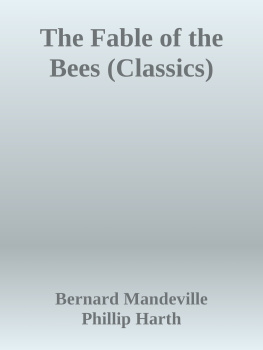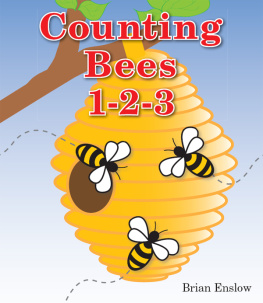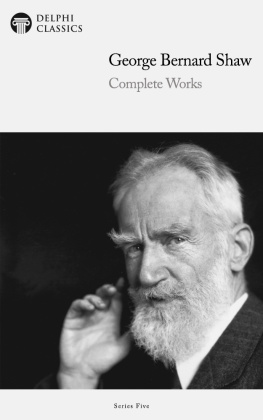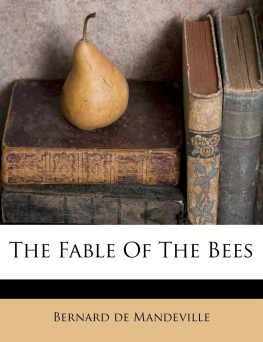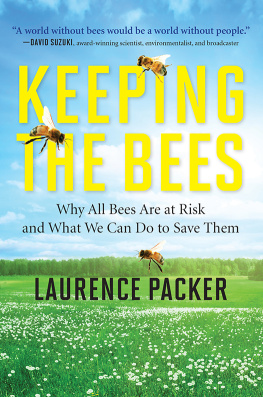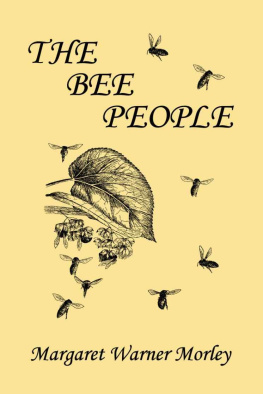Bernard Mandeville - The Fable of the Bees (Classics)
Here you can read online Bernard Mandeville - The Fable of the Bees (Classics) full text of the book (entire story) in english for free. Download pdf and epub, get meaning, cover and reviews about this ebook. year: 2007, publisher: Penguin Books Ltd, genre: Art. Description of the work, (preface) as well as reviews are available. Best literature library LitArk.com created for fans of good reading and offers a wide selection of genres:
Romance novel
Science fiction
Adventure
Detective
Science
History
Home and family
Prose
Art
Politics
Computer
Non-fiction
Religion
Business
Children
Humor
Choose a favorite category and find really read worthwhile books. Enjoy immersion in the world of imagination, feel the emotions of the characters or learn something new for yourself, make an fascinating discovery.
- Book:The Fable of the Bees (Classics)
- Author:
- Publisher:Penguin Books Ltd
- Genre:
- Year:2007
- Rating:4 / 5
- Favourites:Add to favourites
- Your mark:
- 80
- 1
- 2
- 3
- 4
- 5
The Fable of the Bees (Classics): summary, description and annotation
We offer to read an annotation, description, summary or preface (depends on what the author of the book "The Fable of the Bees (Classics)" wrote himself). If you haven't found the necessary information about the book — write in the comments, we will try to find it.
The Fable of the Bees (Classics) — read online for free the complete book (whole text) full work
Below is the text of the book, divided by pages. System saving the place of the last page read, allows you to conveniently read the book "The Fable of the Bees (Classics)" online for free, without having to search again every time where you left off. Put a bookmark, and you can go to the page where you finished reading at any time.
Font size:
Interval:
Bookmark:


THE FABLE OF THE BEES
B ERNARD M ANDEVILLE (16701733) was a native of Rotterdam in Holland. He attended the Erasmian school there and went to the University of Leyden, where he qualified as a doctor of medicine. Within a few years he settled in London, where he practised medicine and acquired great skill in the English language as a writer and conversationalist.
In 1705 he published a doggerel poem called The Grumbling Hive: or, Knaves Turnd Honest. It was reprinted anonymously in 1714 along with An Enquiry into the Origin of Moral Virtue, and a series of remarks, under the title The Fable of the Bees, or Private Vices, Public Benefits. An expanded edition appeared in 1723, with an Essay on Charity and Charity Schools, A Search into the Nature of Society, and further remarks. In 1724 Mandeville enlarged the book again by adding A Vindication of the Book.
The Grand Jury of Middlesex presented this work as a public nuisance, and it was denounced in the London Journal and attacked by numerous people, although Doctor Johnson found it a source of illumination. To many it gave great offence; it was also highly popular.
Mandeville wrote many other pieces, largely in the same satirical vein.
P HILLIP H ARTH has taught since 1965 at the University of Wisconsin, Madison, where he is Merritt Y. Hughes Professor of English and a senior member of the Institute for Research in the Humanities. He taught earlier at Northwestern University, and was a visiting professor at the University of Virginia in 1973. He is the author of Swift and Anglican Rationalism (1961) and Contexts of Drydens Thought (1968), and has edited New Approaches to Eighteenth-Century Literature (1974).
THE
FABLE
OF THE
BEES

BernardMandeville
Edited with an introduction by
PHILLIP HARTH
PENGUIN BOOKS
PENGUIN BOOKS
Published by the Penguin Group
Penguin Books Ltd, 27 Wrights Lane, London W8 5TZ, England
Penguin Books USA Inc., 375 Hudson Street, New York, New York 10014, USA
Penguin Books Australia Ltd, Ringwood, Victoria, Australia
Penguin Books Canada Ltd, 10 Alcorn Avenue, Toronto, Ontario, Canada M4V 3B2
Penguin Books (NZ) Ltd, 182190 Wairau Road, Auckland 10, New Zealand
Penguin Books Ltd, Registered Offices: Harmondsworth, Middlesex, England
First published in Pelican Books 1970
Reprinted in Penguin Classics 1989
Introduction and notes copyright Penguin Books Ltd, 1970
All rights reserved
Except in the United States of America, this book is sold subject to the condition that it shall not, by way of trade or otherwise, be lent, re-sold, hired out, or otherwise circulated without the publishers prior consent in any form of binding or cover other than that in which it is published and without a similar condition including this condition being imposed on the subsequent purchaser
ISBN: 978-0-14-195859-0
.
I NTELLECTUAL works which have won lasting recognition usually owe their importance to the influence they have exerted, at least for a time, on sympathetic readers. The Discourse on Method, An Essay Concerning Human Understanding, and The Origin of Species all had to fight their way against the lethargy and even hostility which await most new ideas, but they succeeded, nevertheless, in winning acceptance and changing the course of mens thinking. In some cases, of which the Discourse Concerning Method is an instance, this acceptance was followed by rejection from a later generation; yet the effect of an idea, once it has been adopted, is beyond calculation. In some form, modified almost beyond recognition, it survives the change in fashion which overtakes thoughts as well as things.
A few intellectual works, however, owe their importance far more to the controversy they excited and the opprobrium they earned than to any proselytes they were able to win. One thinks particularly of three works of this kind whose notoriety is the best measure of their influence: The Prince, the Leviathan, and The Fable of the Bees. By acting as irritants which contemporary readers found impossible to ignore, each of these books stimulated men to re-examine their ways of thought in order to justify their exasperation. In England, indeed, for a period of 200 years the authors of these three books appeared as successive embodiments of the Faust legend. Machiavelli for the Elizabethans, Hobbes for the subjects of Charles II, and Mandeville for eighteenth-century Englishmen became, each in his turn, a continuing figure of the perverse seeker after knowledge who serves the
Surprisingly little is known about the private life of the man who gained so much notoriety through his writings. Bernard Mandeville was born in Rotterdam in 1670, attended the Erasmian School there, and entered the University of Leyden in 1685, where he pursued the study of philosophy and medicine. In 1691 he received the degree of Doctor of Medicine and began practice as a specialist in the hypochondriack and hysterick passions, or what would be called today nervous diseases. Within a few years Mandeville resolved to learn the English language, visited London for this purpose, and decided to settle there. Resuming the practice of medicine, he married an Englishwoman in 1699 and remained a successful and respected London physician until his death in 1733. But his ambition to master the English language, which had first brought him to his adopted land, had meanwhile offered him the opportunity of following a second career as a writer, and it was in this role that he was to win lasting fame.
Mandevilles first appearance as an English writer was in the modest role of translator. In 1703 he published Some Fables after the Easie and Familiar Method of Monsieur de la Fontaine, all but two of which were renditions, in doggerel verse, of selections from the famous Fables, some of which had already been translated in another version by John Dennis, who was later to become a violent antagonist of Mandevilles. The next year, 1704, Mandeville brought out two further books of verse translation from the French. The first of these, Aesop Dressd or A Collection of Fables Writ in Familiar Verse, included English versions of ten additional fables by La Fontaine along with those he had already published the previous year. The second, Typhon: or the Wars between the Gods and Giants, was a translation into English verse of the first canto of Scarrons burlesque poem, which, like the Fables, already existed in an earlier English version.
With these publications Mandevilles brief career as a translator ended as abruptly as it had begun. It had been hack work, probably undertaken to supplement his income at a time when he was still building his medical practice, but the exercise it afforded in turning verse fables and burlesque poetry into English also determined the bent of Mandevilles earliest efforts as an original author. In his first book he had included, along with his translations of twenty-seven of La Fontaines fables, two of his own, The Carp and The Nightingale and the Owl, which exposed some of the follies connected with pride. His next original work was somewhat more ambitious. It appeared as an anonymous sixpenny pamphlet in 1705 and was called
Font size:
Interval:
Bookmark:
Similar books «The Fable of the Bees (Classics)»
Look at similar books to The Fable of the Bees (Classics). We have selected literature similar in name and meaning in the hope of providing readers with more options to find new, interesting, not yet read works.
Discussion, reviews of the book The Fable of the Bees (Classics) and just readers' own opinions. Leave your comments, write what you think about the work, its meaning or the main characters. Specify what exactly you liked and what you didn't like, and why you think so.

